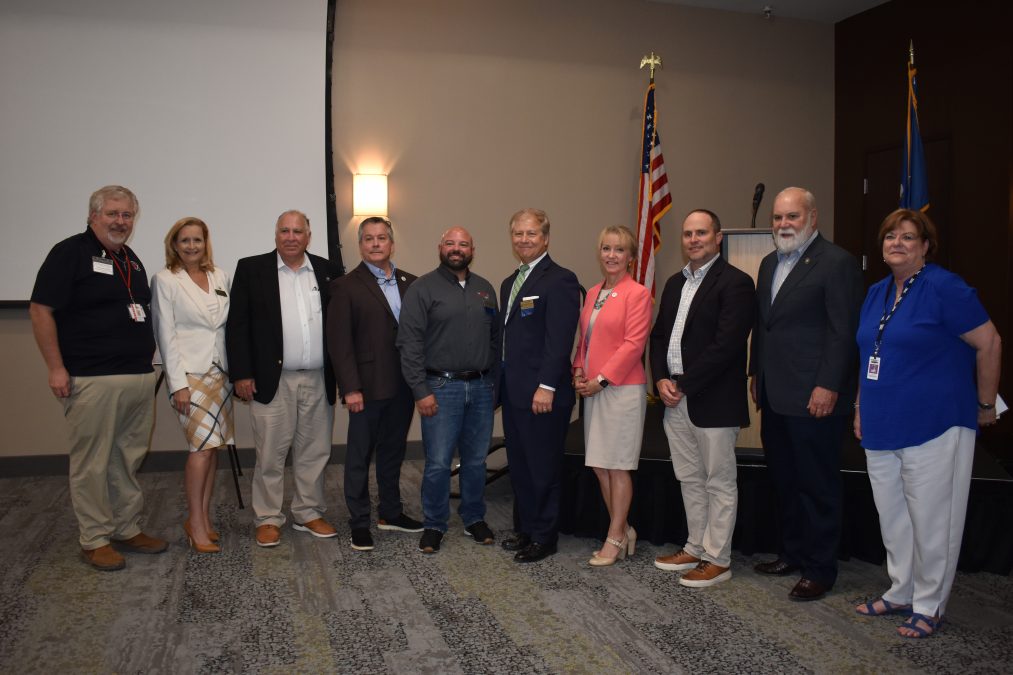
Local Grant Revives Houma Kiwanis’ Musical Instrument Loan Efforts
June 22, 2022
South Louisiana Veteran’s Outreach Hosts Freedom Fest Crawfish Boil Cook-Off June 25
June 22, 2022Our Local delegation Senator Bret Allain, Senator Mike Fesi, Representative Beryl Amedee, Representative, and Speaker Pro Tempore Tanner Magee, and Representative Jerome “Zee” Zeringue shared 2022 Regular Legislative Session updates at the Houma-Terrebonne Chamber of Commerce General Membership Luncheon yesterday.

Senator Bret Allain
Senator Allain specifically shared monies allotted to the area from the state’s budget. After Constitutional Amendment Number 2 passed last year, Allain mentioned the local delegation has been busy fighting for a decrease in the maximum allowable individual income tax rate, which went from 6 percent to 4.75 percent for tax years beginning in 2022, “we’re looking at ways to bring it down even further,” the Senator said. They are also advocating for reductions in corporate income tax and franchise tax to bring those down further. He then went into detail about capital outlay which he said was a group effort, “This is one of the strongest delegations, right here,” he said:
- South Louisiana Wetland Center, Phase two, $650,000
- Replacement of Brady Road Bridge planning and construction, $5.8 million
- Replace D-18 Pumping Station at Falgout Canal in Theriot planning and construction, $7.8 million
- Renovation of LePetite Terrebonne Theater planning and construction, $700,000
- Terrebonne Sports Complex planning and construction, $ 3.9 million
- Valhi Extension (Savanne to LA 311) planning and construction, $6.6 million
- Terrebonne Basin Watershed Phase one and two planning and construction, $6 million
- Bayou LaCarpe Watershed Project, Location C Design and Construction, $1.7 million
- Westside/Alma Street Drainage planning and construction, $792,000
- Terrebonne Economic Development Authority- Maritime Manufacturing Facility planning and construction $44 million
- Houma Navigational Canal Deepening Project, planning, design, construction, right-of-ways, relocations, and utilities, $51 million
- Terrebonne Port Commission Slip Dredging, $5 million
- Fletcher Technical Community College Precision Agriculture Training Facility, planning and construction $11 million
- I-49 South from Lafayette to Westbank Expressway, Planning, Engineering, Right-of-Way, Utilities, and Construction, $232 million
- Nicholls State University Coastal Center Facility planning and construction, $17.35 million
- Nicholls State University Stopher Gym Upgrades planning and construction, $1 million
- Nicholls State University New Nursing Building planning and construction $20 million (will be built in the next two years)
Allain said he is very proud of not only his accomplishments, but also the local delegation to achieving funds for the area, “Nicholls got more funding than LSU in Baton Rouge this year, and as a region, you got more funding than anybody else in the state,” he said

Senator Mike Fesi
Senator Fesi shared that the finance committee started two weeks earlier than the session to ensure the budget was out on time, “It was a lot of hard work,” he said,” It was phenomenal after Hurricane Ida, being one of the strongest storms to hit the coast, and the eye came over our parish between Lafourche and Terrebonne. We did a fantastic job on seeing how resilient we are and come back as strong as we have so soon.” He said they received constant questions in the Insurance Committee about policies and they have done an abundance of work trying to get the residents more understanding of the policies they have. He noted that many people simply didn’t know their deductibles were so high, “It was very devastating to hear the stories in the Insurance Committee of the devastation..but as a whole, I think we did a good job in trying to get things back in order for insurance,” he said.
Senator Fesi mentioned a resolution for renewals he penned, “A lot of times you go to renew your policy your insurance company won’t give you a quote until the last minute and then you have to hurry up and cover it just because you don’t have time to shop,” he said,” so we’re working on making an advantage where they give the quote at least 30 days before so you can actually shop for insurance.”
He is also on the Natural Resources Committee where he said they had projects come through to help rebuild the coast. He touted that a resolution the delegation passed went through the Senate with flying colors, 35 yeas, and 0 nays, and flew through the House with 95 yeas and 0 nays. He said the resolution involves “watching the Biden Executive Order on environmental justice.” Fesi said the order gives the Environmental and Natural Resource Committee so much power that they can subpoena energy companies, making sure they’re staying within the environment, “It’s one of those things we have to keep an eye on because it can be definitely a problem in our state if we don’t watch it,” he explained.

Representative Beryl Amedee
Representative Amedee began explaining that the unemployment trust fund was completely depleted due to the pandemic which led to them having to find ways to replenish the trust without putting the burden on businesses. She mentioned that they passed small business innovation bills that dealt with funds that promoted applications for federal grants for innovation, retention, and recruitment. “We saw a lot of efforts to combat the administrative overreach of excessive renewals of the health and emergency mandates that violated our constitutional rights,” she said. She went on to explain most of the bills were unsuccessful and the few that did pass were recently vetoed.
Amedee described a passed bill that prevents property owners from evicting tenants for 30 days in areas that are under a Federal Disaster Declaration and a bill that requires nursing homes to have emergency preparedness plans for their licensing process. The emergency plan will have to be approved annually and the Fire Marshall will have to inspect and approve, the evacuation sites that are chosen before they can be utilized.
Amedee said they learned that Mississippi put in place a heavy emphasis on phonics in early education three years ago. She shared the reading scores have improved tremendously and Louisiana is following suit which includes making changes that have started this year. Louisiana will focus heavily on phonics-based reading programs and it is expected that reading scores will improve as well.
She also noted details about the case of the Supreme Court on the verge of overturning Roe V. Wade, “We passed several bills concerning abortion in Louisiana,” she said,” but the main one I want to mention is SB 342.” She said over the past 50 years, they have passed laws restricting abortion and many are waiting for the overturn of Roe V. Wade to be triggered. She announced, “Now that we might be on that horizon, we have reviewed those laws, and found a lot of those laws were conflicted. So this bill aligned a lot with what we already have in statute so that when the time comes when Roe V. Wade is overturned, Louisiana laws will make abortion virtually illegal across the board in Louisiana which some people have waited a really long time for.”
With the effect of the pandemic, they passed a few Labor laws- one continues the current maximum amount of weekly benefits and tax rate and deductions for employers for the unemployment compensation for the calendar year of 2023. Another law passed requires the work commission to regularly compare death records with unemployment insurance.
In regards to catastrophe response, they passed SB 412 which offers grant incentives to encourage new insurance companies to join the Louisiana property insurance market and HB 521 requires every company that offers insurance contracts to maintain a catastrophe response plan. Louisiana HCR 84 memorializes Congress to review and reform the national flood insurance program and the pricing method.

Representative Tanner Magee
Representative Magee began by explaining that he has been tired of being second to last in everything when it comes to Louisiana compared to the rest of the nation and that was one of the biggest factors behind him running for office, “For the first time since I’ve gotten elected,” he said,” I feel like we’ve made progress.” He continued to explain that he understands it won’t happen overnight, just as it did not happen overnight to fall to the rankings; it is a process. He has faith that the investments made in early childhood education will have tangible results in our community and believes that infrastructure has taken a turn for the better due to some funding that has been coming through.
He explained that Louisiana’s grading for infrastructure was a D- going into the session, however, HB 514 has moved $350 million from sales tax to DOTD which has directly benefited Louisiana with federal infrastructure monies. He said that there will be massive investments into I-49 South, I-49 North, City River Bridge, and more. He said it’s a huge gain statewide as they use the dollars to further projects.

Representative Jerome “Zee” Zeringue
Representative Zeringue began by explaining the importance of working together as a delegation to get the work done that they have accomplished. He said the session was mainly dealing with investments in education and infrastructure,” We made the largest investment in education that was ever made in the state before,” he said. He continued by announcing the number of investments that have been made for education which includes $8 million to early childhood education, and pay raises for teachers that are one of three raises over the past four years, totaling $3,300 since the first raise. Higher education contributions have been significant and Zeringue commended Dr. Jay Clune for doing a tremendous job at Nicholls State that not only benefits our region but the state as a whole.
He also mentioned funding using Rescue Plan dollars made it possible for investments that directly benefit water resources in Louisiana, “Last year, of the $1.6 billion that was allocated, we used $350 million of that for water sector programs. This year, we are allocating another $450 million…we are addressing critical infrastructure because there are places in North Louisiana that are drinking and bathing in brown water,” he explained. He also said Terrebonne Parish was awarded a $7 million grant that is going towards improving the water system.
During the session, they put $500 million into the Unemployment Trust Fund. Before the pandemic, the fund had $1,2 billion. The pandemic cleared it out and they had to borrow money from the Federal government to pay insurance. “There are triggers that when it gets to a certain level, that they put taxes on the employer,” he explained. They have added additional dollars to the fund so they will not have to reach the triggers which prevent the burden of being taxed.
He said they passed $37 million to improve state buildings, $25 million for additional payments for local police and sheriffs, and $8 million for fully funded cameras in special education classrooms. They are also addressing debt that the state had in addition to the issues of the Unemployment Trust Fund. They put in $400 million to help pay off the state obligation for the hurricane storm system around New Orleans which he explained has improved the state’s bond rate. They put a significant amount into the rainy day fund as well which now has an excess of $750 million which Zeringue said is important.
In terms of the budget, of the $128 million for the highway program, they also have $100 million that will go to the preservation of roads that are off of the state system that is typically rural roads that don’t have funding for improvements.
He explained that in this session, they had to be mindful of the future in terms of recurring expense dollars. They had approximately $750 million of additional dollars that they did not have last year. A substantial amount of that went to one-time expenses and not recurring expenses that will grow, “So theoretically, if the economy continues to improve, or doesn’t get worse, that money will be available that can be used to support our bills,” he explained, “This is the first time in two years that we have to use federal dollars to close the gap.”











